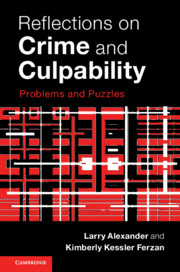Book contents
- Reflections on Crime and Culpability
- Reflections on Crime and Culpability
- Copyright page
- Dedication
- Contents
- Acknowledgments
- 1 Crime and Culpability
- Part I Problems and Puzzles of Risking
- Part II Problems and Puzzles of Culpability
- 6 Moral Ignorance
- 7 The Violator of Deontological Constraints
- 8 Mass Murders, Recidivists, and Volume Discounts
- Part III Problems and Puzzles of Punishment
- Part IV Conclusion
- Index of Hypothetical Cases
- Index
7 - The Violator of Deontological Constraints
from Part II - Problems and Puzzles of Culpability
Published online by Cambridge University Press: 01 October 2018
- Reflections on Crime and Culpability
- Reflections on Crime and Culpability
- Copyright page
- Dedication
- Contents
- Acknowledgments
- 1 Crime and Culpability
- Part I Problems and Puzzles of Risking
- Part II Problems and Puzzles of Culpability
- 6 Moral Ignorance
- 7 The Violator of Deontological Constraints
- 8 Mass Murders, Recidivists, and Volume Discounts
- Part III Problems and Puzzles of Punishment
- Part IV Conclusion
- Index of Hypothetical Cases
- Index
Summary
- Type
- Chapter
- Information
- Reflections on Crime and CulpabilityProblems and Puzzles, pp. 108 - 132Publisher: Cambridge University PressPrint publication year: 2018



